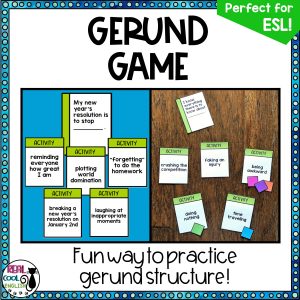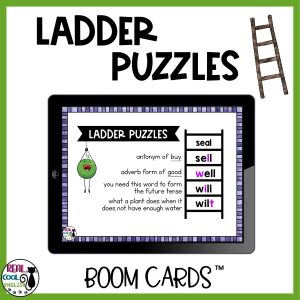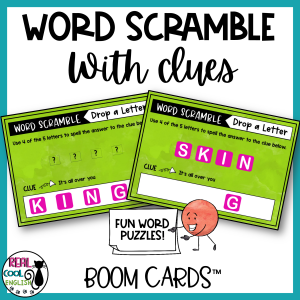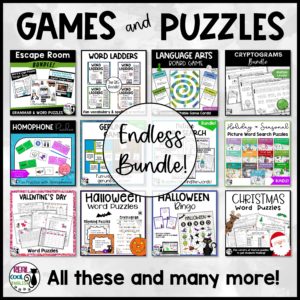Kids, with their endless creativity, found ways to deal with the situation. I heard a story about a student who changed her Zoom background to a picture of herself looking very attentive, and then she was able to do something else during the lesson (most likely space out with her phone) and the teacher was none the wiser. I’m not saying I condone it, but I definitely get it. Sometimes we just need to break up the monotony, but it can be challenging to do while having a class meeting in a video conferencing format.
After what seems like an eternity, much of life has returned to a somewhat normal state. However, online learning was already becoming quite common, and is likely to continue in the future for many students. So it’s as important as ever to find ways to incorporate fun in our lessons, whether in person or virtually.
Games to the rescue!
What do we do when we need to break up the monotony in our classroom? Games! And it’s the best way to do that in a virtual classroom as well. Of course, when we are not meeting in person, there are some extra challenges, but with a little tweaking, we can definitely make it work. Here are some game ideas that you can incorporate into your online lessons, most of which require very little prep work because I am including some resources to help get you started.
I used these games with my Adult ESL students, and it was a great way to encourage discussion while also having fun. These games could certainly also work well for middle school or high school students.
Picture Memory Game
Show an image that contains a lot of different random objects on your screen to the class for a very brief period of time (10 seconds or so) and students need to try to remember as many objects as they can and take turns naming objects. If they can’t think of an object in a set amount of time or if they repeat something another student said, they are out of the round, and play continues until there is only one student remaining. Here are two images that you can use to play this game with your students twice.
As a fun follow up that you can also make into a game, put the picture back up for everyone to see, break the class into groups, and give them the A-Z recording chart to write as many items as possible beginning with as many of the letters as they can. Encourage them to think outside the box by announcing that any items in common will cancel each other out, and only unique answers will be counted. They should also consider all parts of the object, and different ways of naming it. For example for the castle, they might say Q for “queen’s home.” For ESL students, this is a great way to learn new vocabulary: They can refer to a dictionary to discover words they don’t know for some of the specific parts of the objects. For example, they might know the word for sink, but they might not know the words “faucet” or “knob.”
Scavenger Hunt
Make a list of items that can be found around the home. Rather than doing this the usual way by having everyone run around to complete an entire list of random items at the same time, I decided to have them go for one item at a time. I wanted to include some objects they could bring back that would also encourage conversation and discussion. Asking them to find “something they would hate to lose” generates much more conversation than to find “something blue.”
Here is a list of possible objects for a scavenger hunt:
Find something…
- soft (shiny, fluffy, bumpy, etc.)
- given to you as a gift
- you would hate to lose (other than your phone)
- you got while on a vacation
- in the shape of an animal (but not a stuffed animal)
- that has a special meaning to you
- that has a funny or interesting story behind it
- with the name or flag of another country
- that rings or rattles when you shake it
- that you have had for a long time
Find…
- a book that you have read
- a picture of your favorite celebrity
- a snack item that you enjoy
- a picture of a place you love
- a board or card game
- a picture (not digital, but printed and framed, for example)
- the most interesting thing you have that is within your reach
Most of the items can be a springboard for conversation: students can talk about who or what is in the picture and where it was taken, or talk about why they chose a certain book or celebrity, etc.
Word Guessing Game
If you have ever watched the game show Password, this game is inspired by that. There are two teams of two, and only one person from each team has a word that they need to convey to their team member by using one word clues only. They cannot say any form or part of the word. For example, if the word is RAINBOW, they cannot say “rain” or “raining.” The player guessing on each team pays attention to all clues and guesses until they have enough information to come up with the answer.
Depending on the size of your class, you might want to work out the groups and teams beforehand, and send them a list of playing groups and team members along with a numbered list of words so that you can say something like: Group 1 will play now: Player A get your teammate to guess Word 1. So A players would have one list of words to work with, and B players would have a different list.
Here is a list of possible words to use for this game:
- beach
- moon
- candle
- water
- sticky notes
- phone
- potato
- skis
- lamp
- scissors
- window
- magazine
- bowl
- island
- sink
- frog
- robot
- helicopter
- sock
- rainbow
- egg
- backpack
- flag
- mountain
- ladder
- swamp
- balloon
- fire
- waffle
- door
- bathtub
- calendar
- dollar
- carrot
- swimming pool
- toothpaste
- rug
- mouse (for computer)
Categories Game
If you have ever played Catch Phrase, this is inspired by that game. Give students a category, and they take turns naming items that match that category. While they are guessing, a random timer is used and whoever is next to give an answer when the timer goes off is eliminated from the round. Continue in this way until only one student is remaining. I used this random timer, where you can set your own minimum and maximum time, and it will randomly stop somewhere between the times you set.
Here is a list of categories to get you started:
- things done in the water
- things at a gym
- things that have numbers
- things in a backpack
- types of furniture
- things with a handle
- things people keep in their car
- female singers
- brand names of soda
- names of candy bars
- articles of clothing
- countries that start with “S”
- 5-letter words
- U.S. states with the letter A in them
- ways to prepare potatoes
- restaurant chains
- things that need batteries
- things you see at a wedding
- fruits/vegetables
- things you pack for a vacation
I am also including a PDF printable version of the topics for the above three games.
I also have a similar categories type game that I made with the intention of being played in a classroom, but it could definitely work in a virtual classroom setting as well.
Headlines Game
One last activity I did with my students was a type of game based on news headlines. If you are familiar with the famed Florida Man, you will probably find this activity amusing. For the uninitiated, someone started noticing that the wildest, strangest news stories were coming out of Florida, and headlines usually started with “Florida Man [does crazy thing]” and now there are even online groups dedicated to keeping us up to date with Florida Man’s latest shenanigans.
To make this a game, I wrote down headlines with key parts of the crazy story blanked out and I asked students to make their best guesses as to what would fill in the blank. For example:
- Florida man charged with assault with a deadly weapon after throwing _____________ through a Wendy’s drive through window.
Students then tried to guess what he might have thrown through the window. Of course, we need to remind students that this is Florida Man, and so it’s best to eliminate any answers that might sound logical. In most cases, it is unlikely that anyone will actually guess correctly, so you can award points or just declare the winner to the student coming closest to the correct answer. [Spoiler alert: He threw an alligator through the window.]
If you want to try this game with your students, here is a Google Forms document that I created that shows the headline with the blank, and after they make their guess, you can click to the next section which will give you the answer, and often the news article or related image. On the first example, be sure to read the article to find out the ridiculous way he got caught, which is almost as good as the headline!
My students were a group of English language learners, some of whom live in other countries, and some in the U.S., but none of them had never heard of Florida Man before, and they were shocked to realize that the examples I used were all stories about things that happened in real life!
NOTE: This activity is not intended to offend anyone in Florida; it’s all done in good fun, but you could always change the activity so that it just says “Man” or “Teen” or something else if you would prefer not to specifically mention Florida. Also, because these are all related to criminal activity, you might want to review all the sections and delete any examples that you think may not be appropriate for your class.
For a similar fill-in-the-blank activity that will get your students cracking up, you might also like to try my Gerunds Game. (See description below.) It was not specifically designed for a virtual classroom, but I was able to easily adapt it to work for a virtual lesson, and the students loved coming up with funny and crazy sentences!
Don’t forget about escape room games!
These are my absolute favorites, and they are a huge hit with students as well! I have created two digital escape room games that will give your students tons of fun practice with grammar while also building critical thinking and problem solving skills. They are 100% digital, so they are perfect to assign during remote learning or for a team activity in a virtual breakout room, and of course, they can be done in the classroom as well.
Common Grammar and Writing Errors Escape Room will give students practice with concepts that are frequently troublesome in writing, such as spelling (homophones), run-on sentences, sentence fragments, apostrophe use, and inappropriate verb tense shift. In this game, students are investigators solving grammar challenges to discover the location of stolen jewels.
Escape the Decades is another fun activity that will give students practice with grammar concepts. In this game, students find themselves in a time warp where they have been transported back in time to the 1950’s. They solve grammar challenges to make their way through the decades and back to modern times.
I hope these ideas can help you liven up your classes when students need a bit of a break. With a few engaging game ideas in your online teaching toolbox, your students won’t want to put up any fake background pictures and risk missing out on all the fun!
And for another fun idea that was born out of the pandemic, but you can use whether teaching in person or in a virtual classroom: host a PowerPoint party! Your students will love this opportunity to share their ideas and interests all while getting presentation practice. In this blog post you’ll learn how to organize a PowerPoint party and find tons of fun topic ideas to get you started!
Love puzzles and games? Be sure to subscribe below and get a FREE set of fun puzzles and activities!




